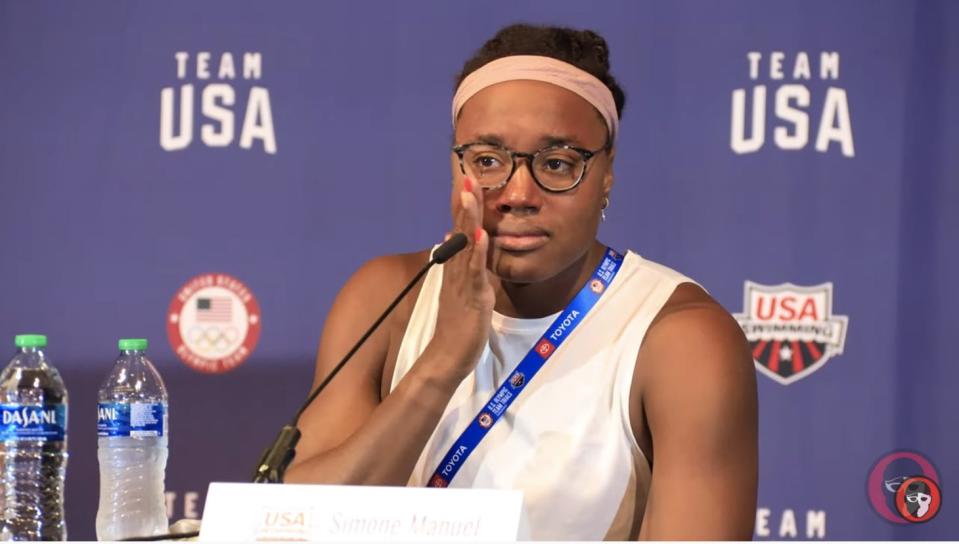Olympic swimmer Simone Manuel said she had depression, insomnia, and other symptoms of 'overtraining syndrome'
- Oops!Something went wrong.Please try again later.
Olympic gold medalist Simone Manuel didn't qualify for the Olympic team at the trials Thursday.
The 24-year-old said she'd been diagnosed with overtraining syndrome, a type of athletic burnout.
The pandemic and being a Black person in America in 2020 compounded her stress.
Champion American swimmer Simone Manuel experienced depression, sleeplessness, decreased athletic performance, and other symptoms of overtraining syndrome earlier this year, she revealed during an emotional press conference Thursday.
Manuel had just missed qualifying for the Olympics during Thursday's trials for the 100-freestyle race - the same event that, at the Rio games, made her the first Black female swimmer to win an individual Olympic gold.
At the press conference in Omaha, Manuel, 24, said she was proud of herself given all she'd been through in the past few months. "I've done everything I possibly could have done to set myself up to be my very best at this meet."
Manuel still has a chance to go to the Olympics for the 50-meter freestyle. Trials for that event begin Saturday.
Overtraining syndrome happens when the training load exceeds the body's ability to recover
Manuel said she started feeling off in January, and then her symptoms - including irritability, a loss of appetite, "easy" workouts feeling hard, and a spiking heart rate even at rest - came to head in March. "Just walking up the stairs to the pool I was gassed," she said.
Her doctor diagnosed her with overtraining syndrome, which occurs when an athlete's training load overrides its ability to recover. While stressing the body forces it to repair and grow stronger, stressing it too much leads to the opposite: sore muscles, fatigue, poor mood, and worsened performance.
Manuel said the pandemic may have contributed to her burnout. "To focus on a goal like that for five years instead of four is draining," she said. Being a Black person in America in 2020 was "brutal" too, she said.
Manuel took 3 weeks off from all exercise
Manuel, with the support of her doctor, coach, and sport psychologist, first dialed back her training. But she didn't get better, so she took three weeks off from all exercise just 11 weeks out from the trials.
Getting back in the pool in April was "an uphill climb," she said. "My body wasn't doing what I knew it was capable of. I had moments where I didn't even want to go to the pool because I knew it was going to be bad."
But during Thursday's race, she gave it everything she had and came in 0.02 seconds away from making the US team. "This is first time I showed up to a meet and before I even dove in and did a race, I was proud of myself," she said.

"I hope that inspires more athletes to feel that way," Manuel said, wiping away tears. "I feel like we're not proud of ourselves until we accomplish something so great. I've done it, I'm an Olympic champion, I know there's more there."
Olympic athletes are opening up about mental health
In the 2020 film "The Weight of Gold," athletes said there's "an epidemic" of suicides and depression in their ranks but no easy way to get help. Olympians may be especially vulnerable due to a lack of identity outside their sport, financial pressures, public failures, and the enormity of dedicating your life to a single moment.
Michael Phelps, who produced the film, recently told Insider his mental health has been "scarier than ever" during the pandemic. He said building up daily practices like meditation and exercise help. "Then you're able to move forward and just keep going, going, going, and that's what I was able to do in my career," he said.
That's what Manuel is doing too. "Maybe it didn't happen today, but this isn't the last time you're going to see me and this isn't the last time I'm going to do something great in the pool," she said. "I'm confident in that.'
Read the original article on Insider

